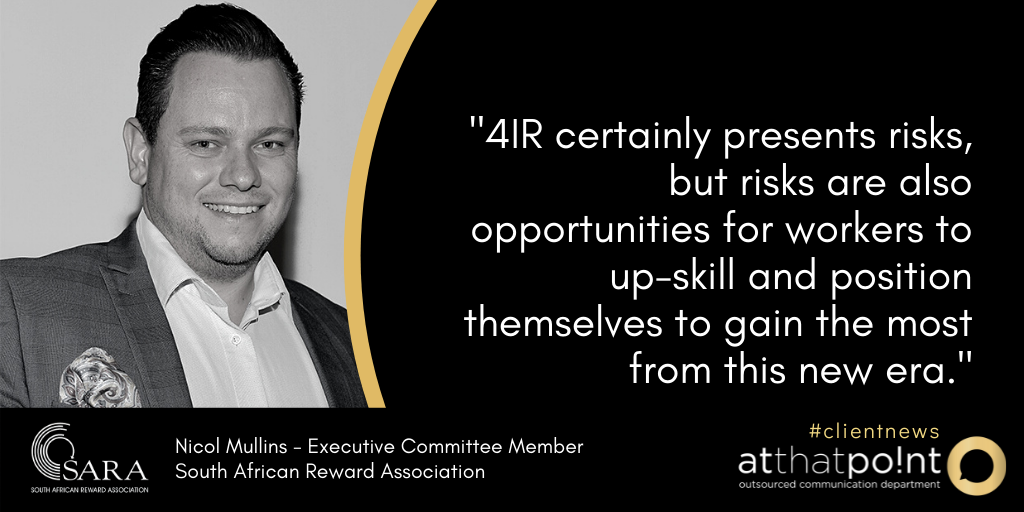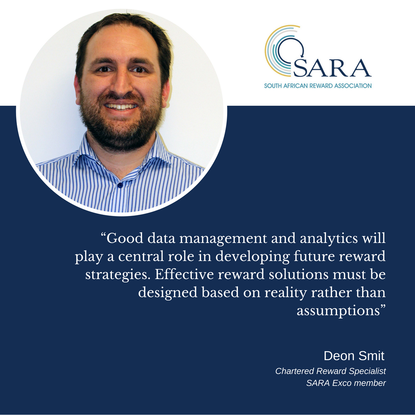 The launch of ChatGPT late in 2022, and the tremendous interest it provoked, inaugurated what one will one day see as the Age of Artificial Intelligence (AI). AI will make it easier to generate outputs in virtually every industry, creating a challenge for reward professionals: how does one measure an individual’s performance when one of his or her outputs can be generated by an algorithm? “AI is here to stay, and we can expect it to get significantly better. Reward professionals should see it as a great opportunity to refine their thinking about what constitutes great performance, and thus how to reward it,” argues Dr Mark Bussin, Master Reward Specialist and Executive Committee Member of the South African Reward Association (SARA). “Specifically, AI prompts us to look at what humans do best and use that insight to determine how we measure and reward our people.” Dr Bussin offers the following tips to help reward professionals, and HR more generally, to use the AI revolution to the advantage of their organisations: Focus on creativity, quality and innovation. AI is going to be a great tool for automating routine tasks, but when it comes to creative problem-solving or generating innovative ideas, it is a non-starter. Finding ways to reward individuals or teams for creativity rather than output would be beneficial to both the employees and the organisation. Similarly, reward professionals should look for metrics that measure quality rather than quantity. For example, customer satisfaction or product ratings could be used to assess the performance of an individual or team. Emphasise collaboration. Humans have leveraged the power of collaboration to overcome seemingly insurmountable challenges over thousands of years. Encouraging individuals or teams to work together and rewarding them for doing so will play to humanity’s strengths and will generate excellent results. Provide a sense of purpose. Humans are motivated to perform better when they feel their work is making a positive impact—AI is just a machine. Global research shows that purpose-driven companies realise huge benefits. Making sure the organisation has a clear vision and purpose can motivate employees to do their best, and ultimately drive the company’s performance in achieving its strategic goals. Develop policy guidelines relating to the use of AI. Everybody in the organisation needs to know how AI should—and should not—be used. Each industry will have its own set of ethical issues, and employees will need charts to navigate this tricky terrain. Provide professional development opportunities. It’s long been recognised that professional development is a key lever when it comes to attracting and retaining top talent—and driving high performance. Alongside providing policies to guide employees, organisations must provide employees with ongoing training in this rapidly changing technology and what it means for them. They will use it better and, as an added bonus, they will be more likely to remain with, or want to join, the organisation. Use AI to speed up the drafting of reports and policies. Finally, HR and reward professionals themselves should find ways to use AI to make themselves more efficient. Freeing up more time to be devoted to adding value will also protect their own positions. “The onward march of AI is in fact an opportunity for us all, and reward professionals in particular, to concentrate on the things that humans do best and focus on supporting them—leaving the drudge work to the machines,” Dr Bussin concludes. ENDS MEDIA CONTACT: Rosa-Mari Le Roux, [email protected], 060 995 6277, www.atthatpoint.co.za For more information on SARA please visit: Website: www.sara.co.za Twitter: @SA_reward LinkedIn: South African Reward Association Facebook: SARA – South African Reward Association
1 Comment
 “The Fourth Industrial Revolution is about the acceleration of innovation and the velocity of disruption, and these two factors are creating disruption and along with this, new opportunities for business,” says Nicol Mullins, Chartered Reward Specialist and Executive Committee Member at the South African Reward Association (SARA). He observes that Covid-19 has served as a catalyst for the adoption of Fourth Industrial Revolution (4IR) technologies, along with forcing the development of new business models or the adaptation of existing ones. This trend is also redefining the approach employers take to remuneration and reward. A New Perspective on Reward “4IR certainly presents risks, but risks are also opportunities for workers to upskill and position themselves to gain the most from this new era,” says Mullins. This is especially true of the massive global move towards the virtual workplace, with many employees now working exclusively from home and connecting with their organisations, teams and managers digitally. Most organisations have pivoted rapidly to this new normal while others have not been as quick to transition. Either way, businesses are reviewing their strategic outlook based on a new set of challenges they face and resources now available to them due to the automation of repetitive, routine processes. “Reward strategies must likewise be adapted to complement this new paradigm and align with reimagined business strategies to contribute the highest value to their achievement,” says Mullins. Expanded Talent Possibilities An important effect of digitalisation is that talent sourcing and recruitment in a virtual world is not restricted by national borders. Or to humans. Instead, 4IR is blurring the boundaries between the physical, digital and biological, allowing organisations to draw from a worldwide pool of talent and specialisation. Resources no longer need to be situated locally but can contribute to corporate outcomes from anywhere on the planet. Because of this, reward strategies are shifting from an internal-only focus to include external parties as well. While companies have long followed a build, borrow or buy approach to talent planning and acquisition, borrowing is coming to the fore. “Organisations can more readily direct work to underutilised personnel without being constrained by departmental or divisional boundaries, resulting in greater efficiency and productivity,” says Mullins. Similarly, freelancers can be more seamlessly integrated into business processes to tackle activities that require professional attention, but not so frequently as to justify permanent staff. Better Reward Strategies As they embrace virtual workspaces, a more fluid talent mix and flexible work assignments, organisations must also determine how rewards should be structured for both internal and external staff requirements. For short term assignments, freelancers may be considered vendors who bill clients for their work and manage their own benefits and work-life balance. For long term contractors, especially those offering scarce or critical skills, a viable reward policy should be investigated. Employers may also consider hiring out specialist staff to other organisations, earning extra income when their workload is low. Embracing a sharing economy. How to design and implement remuneration and reward programmes appropriate to these dynamics falls squarely within the purview of the reward specialist. “Now is the ideal time for organisations to engage closely with their reward practitioners, whether inhouse or outsourced, and involve them more deeply in workforce planning and strategy,” says Mullins. ENDS MEDIA CONTACT: Idéle Prinsloo, 082 573 9219, [email protected], www.atthatpoint.co.za For more information on SARA please visit: Website: www.sara.co.za Twitter: @SA_reward LinkedIn: South African Reward Association Facebook: SARA – South African Reward Association Companies usually base how they pay and reward their employees on financial data. Deon Smit, Chartered Reward Specialist and Executive Committee Member at the South African Reward Association (SARA), says that corporate communications like emails or instant messages, social media posts and many other data sources should be used to provide deeper insights.
These insights can help to keep financial and non-financial elements of remuneration relevant to what employees need as motivation. “Good data management and analytics will play a central role in developing future reward strategies. Effective reward solutions must be designed based on reality rather than assumptions,” says Smit. “Reward practitioners must start taking responsibility to gather the right information and develop the ability to draw valid conclusions from the data available.” Smit offers the following practical guidance: Start with a purpose It’s important to decide what business problems should be solved first and what data is best suited to that purpose. “Tackle the simple business problems first and build up to the big ones,” advises Smit. “This will help you get your data and your process right at each discrete level of growing complexity.” HR and people data will be central to efforts, but strategic, financial, and corporate communications data will also play an important role. Be a visionary For most problems, a large set of historical data is needed to facilitate predictive analysis and produce accurate results. “You have to decide what you want to measure in 6 months from now, build the datasets and make sure the data is accurately captured,” says Smit. “Only after that period will you have enough to work with.” Clean up “One of the first mistakes companies make is to start with incomplete, incompatible or mismatched data,” reports Smit. The data collection methodology employed must be consistent to ensure there are no information gaps that could produce misleading results. Learn Reward practitioners should understand how datasets are constructed, how relational databases work and how unstructured data found in emails, social posts and other digital sources can be collected. They also need to evolve past Excel and embrace programming languages like R (a statistical language), Python (a general programming language) or SQL (a database query language). In addition, business intelligence and data analysis skills are essential. This may seem unnecessary for reward programmes but Smit foresees that these competencies will be in demand in the future. “HR will start hiring data specialists over people specialists because data will become the key to understanding workforce behaviours and motivators,” says Smit. He suggests that practitioners become self-educated to increase their value. Universities now offer numerous free courses on these subjects through MOOC (massive open online courses) platforms. Don’t forget qualitative inputs Although quantitative analysis - mathematical and statistical modelling - is critical, reward specialists should not overlook qualitative analysis - the study of observable behaviour or structure. “Don’t become too focused on the numbers,” recommends Smit. “They need to be viewed in conjunction with phenomena like group dynamics, behavioural psychology, generational concerns, cultural norms and other non-numerical inputs.” Start over Data analysis must always solve a business problem. Once the collected information has been studied and understood, reward specialists can develop innovative solutions and drive their implementation forward. Smit concludes: “After a solution has been found, the cycle will start over so that another – more complex – business problem can be targeted.” ENDS MEDIA CONTACT: Juanita Vorster, 079 523 8374, [email protected], www.atthatpoint.co.za For more information on SARA please visit: Website: www.sara.co.za Twitter: @SA_reward LinkedIn: South African Reward Association Facebook: SARA – South African Reward Association  Recent reports have highlighted the disparity in remuneration between CEOs and workers. Consequently, many commentators have questioned the fairness of executive packages, calling for greater regulation of those salaries and benefits. According to Dr Mark Bussin, Executive Committee Member of the South African Reward Association (SARA), this is a problem domain ideally suited to the Reward Specialist. “First,” says Dr Bussin, “one must understand how remuneration is determined at various levels.” General workers For general workers, a fair wage is decided through collective bargaining, striking a balance between what employers can afford and trade union negotiators are willing to accept. “It’s notable that recent increases have been in the 7% to 8% range - higher than CEOs,” reports Dr Bussin. “Companies, aware of the pay gap, it seems, are trying to close it.” Salaried staff For salaried staff, various factors are considered, including salary surveys, inflation, education, personal performance, and the scarcity of an employee’s skills. “Ultimately,” says Dr Bussin, “the finance department budgets for an overall payroll increase in line with inflation, currently around 6%.” CEOs and directors Executive salaries are more complex. Dr Bussin explains that CEOs and directors face much higher pressure than other employees. “Their track record for leading companies successfully in the face of overwhelming personal risk is why they’re engaged. As such, they command commensurate reward.” They’re usually compensated in two ways. Fixed pay Executive officers get a fixed salary that is mainly determined by benchmarking. This includes salary surveys and comparative studies of companies of similar size and complexity. Their pay in relation to these measurements will depend on the organisation’s remuneration policies. Variable pay Executive officers also receive short-term and long-term incentives. Short-term incentives are based on performance targets that, if achieved, usually result in a reward of between 50% to 100% of fixed annual salary. Long-term incentives, linked to company performance, are full shares and share appreciation - the value of the increase in share price. Pay discrepancies However, an ill-conceived remuneration package can reward even an underperforming executive officer. “These are the cases we see highlighted in the media,” observes Dr Bussin. “The perception that executives are overpaid is then generalised when, most often, their salaries are carefully formulated against industry norms.” Real or imagined, companies want to avoid any notion of biased remuneration. Dr Bussin says the King IV Report offers greater transparency by requiring executive remuneration reporting as a single total figure. “Businesses can leverage this opportunity to show that their executive officers are indeed compensated fairly.” The Reward Specialist A Reward Specialist should be engaged to ensure executive pay does not overstep the boundaries of sanity. At times, shareholders or the board may be desperate to turn a company’s fortunes around, making them bullish about a maverick hire. Here, the Reward Specialist offers an impartial perspective based on in-depth analysis. “Lastly,” concludes Dr Bussin, “Reward Specialists can create a communication plan that educates employees, shareholders and the public on company remuneration policies and executive compensation, avoiding both the reality and perception of their executives being overpaid.” ENDS MEDIA CONTACT: Carla Coetzee, [email protected], www.atthatpoint.co.za For more information on SARA please visit: Website: www.sara.co.za Twitter: @SA_reward LinkedIn: South African Reward Association Facebook: SARA – South African Reward Association Technology plays a vital role in the evolution of employee reward and incentive programmes, ensuring that the processes are supported and systems seamlessly managed so as to effectively deliver on the employee value proposition (EVP). Technology is the enabler of almost all innovative processes and business models and must not be defined narrowly as an ingredient or component, but rather as a tool which can reveal what is possible and support what is already in play.
“Reward strategy must be approached holistically,” explains Peet Kruger, Exco member, South African Reward Association (SARA). “It is essential that technology be integrated into the reward value chain and be seen as an enabler. It cannot drive strategy, but it plays a powerful role in the implementation of strategy.” Understanding the role of technology “The way in which a business uses technology to support and integrate its delivery of “reward products” to employees can play a critical role in the organisation being seen as an employer of choice,” says Kruger. Organisations can harness technology’s omnipresence to integrate reward solutions into all layers of the business. This will then allow for richer employee engagement and support the delivery of reward and remuneration solutions by aligning them more closely with the people - especially those that grew up with technology -and overarching strategic goals of the organisation. In the value chain, reward is assessed along specific lines to ensure it supports business strategy. It has to take many factors into consideration which include: the skills required, the reward needed to attract these skills, the payment structures, the non-financial rewards which have to be blended into the overall package and the steps which both employee and organisation have to take in order to ensure these are done correctly and within specific parameters. Technology: a valuable solution Not only does technology help to streamline processes and enhance reward management structures, it enables us to quantify and package the reward value proposition in such a way that it is simple to understand and appealing to the end user. Employees can see how they contribute to overall organisational success, get a clearer picture of how their rewards are structured and see how much the company is investing in them from a total reward perspective. “There is a growing shift towards the Total Reward Statement which consolidates all the data held within the technology systems and uses this to support and improve reward management throughout the business,” concludes Kruger. “It is a visual representation of the total reward investment in each employee and is a step up from the traditional payslip which mainly focuses on the financial breakdown of the salary package of the employee. This educates, sensitises and create an appreciation for the total reward value proposition enjoyed by employees and contributes to improved engagement and retention of employees”. ENDS MEDIA CONTACT: Cathlen Fourie, 012 644 2833, [email protected], www.atthatpoint.co.za For more information on SARA please visit: Website: www.sara.co.za Twitter: @SA_reward LinkedIn: South African Reward Association Facebook: SARA – South African Reward Association |
Archives
March 2023
Welcome to the South African Reward Association newsroom.
Categories
All
|


 RSS Feed
RSS Feed